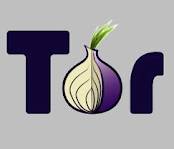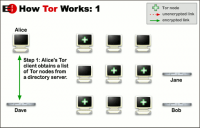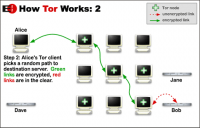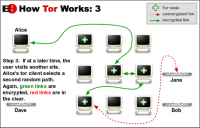Tor
Contents
Overview
Tor software is a free downloadable and open source browser for Windows, Mac, Linux/Unix, and Android.[3] The name "Onion Routing" refers to the specific way the data is encrypted in various layers. It works by preventing traffic analysis of packets being sent from the user's computer. Tor routes the packets through a route that is hard to follow for trackers, and periodically erases the online 'footprint'. [2] The packets take a route through the computers of various volunteers who have downloaded Tor and set it up as a relay. Tor uses the same circuit for connections for 10 minutes to ensure privacy and security.[2]
While Tor is able to scramble data through its routes to ensure that user's packets are anonymous, Tor does nothing to monitor attempts to identify traffic entering the site, providing a means of identification and accountability for interested parties.
Uses of Tor
Tor is used to improve privacy on the Internet by individuals, journalists, companies, and the government.[2]
- Individuals can use Tor to access content blocked by local internet providers, as well as browse the internet with privacy and security.
- Journalists use Tor to communicate more safely with whistleblowers and dissidents.[2]
- Companies use the service to allow their workers to connect to their home website while they're in a foreign country, without notifying everybody nearby that they're working with that organization.[2]
- The government has implemented the use of Tor in open source information gathering, including a branch of the U.S. Navy.[2]
Due to the private nature of Tor, it is also frequently used by criminals for such purposes as finding assassination markets, drug trafficking, password cracking discussion, and child pornography.
Ethical Concerns
Because Tor anonymizes traffic, it makes it possible for criminal activity to happen on the internet. The approach the Tor website takes on this issue is that "Criminals can already do bad things", and "Tor aims to provide protection for ordinary people who want to follow the law. Only criminals have privacy right now, and we need to fix that."[4] The platform itself is not meant for criminal activity, as it does not dictate or suggest how a user can or should use the anonymity it provides. The ethical use of Tor would be to use it to keep information safe that could be tracked otherwise. This includes the use by journalists to keep informants safe, as well as activist groups who need to stay anonymous or face arrest. The Tor site also mentions that individuals also use Tor for socially sensitive communication: chat rooms and web forums for rape and abuse survivors, or people with illnesses.[2] The issue focuses mainly about online privacy, in this case an extreme case of it. It is difficult for the government to track criminals who use Tor for illegal activity, which could be argued to be a reason that it is ethically wrong. Meanwhile, it does serve moral purposes, and in itself is not a morally wrong object.
The Silk Road
The Silk Road is an illegal online market place accessed solely through the Tor browser. Through the Silk Road, any user with internet access can purchase marijuana, opiates, hallucinogens, pornography, forgeries, and many other banned paraphernalia. Gaining access to the site is simple. Entering the phrase "silk road tor" into any search engine quickly brings up links with tutorials on how to access the site.[5] The site was launched in February of 2011 after 3 months of development. Registration is an easy process and costs nothing. Estimates for the monthly sales numbers are slightly over 1.2 million USD per month. [6] All transactions are completed using the Bitcoin monetary system.
Site Format
Once on the site, the Silk Road operates much as Amazon or eBay do. There are categories on the left column which allow the user to sort through the wide variety of options. Browsing through the different categories reveals many different options of products. For example, at the time of this edit, there are over 1,000 different options for purchasing cannabis. A system of feedback used by any respectable online marketplace is used where sellers earn feedback from buyers. A minimum rating must be maintained to continue to sell on the site. Once a purchase has been completed by a buyer using the appropriate amount of Bitcoins, the seller uses anonymous postage to send the package to whatever address the buyer chooses. Within a matter of days, buyers leave feedback on how the product was, seller interaction, etc., and the transaction is complete. Feedback is left based on a 5 point scale and anything less than 5 is considered a poor transaction by the community. The buyer receives illegal substances anonymously and the seller profits from a vastly expanded internet audience.
Government Action Against the Silk Road
Because the Tor Browser provides anonymous internet browsing, there is very little agents from government drug agencies such as the DEA can do.[7] Other than capturing less than 1% of the shipped contraband using drug dogs and other tactics, chasing the parties involved online is nearly impossible. The founder of Bitcoin did issue a warning that the cyber currency may not be entirely anonymous due to public logs kept of the transactions. According to Adrian Chen, a writer for the website Gawker which first brought the Silk Road into the public eye with an article in June of 2011, some users are being caught by the DEA.[8] A cocaine seller named MiN was reportedly busted in August 2012 after accepting a traceable Western Union money order instead of using Bitcoin. This could potentially lead DEA agents to the addresses of users to whom MiN had shipped the narcotics. The event did not seem to rattle users too much though, as business continues on at a brisk pace.
See Also
References
- ↑ https://www.torproject.org/projects/torbrowser.html.en
- ↑ 2.0 2.1 2.2 2.3 2.4 2.5 2.6 2.7 https://www.torproject.org/about/overview.html.en#whyweneedtor
- ↑ https://www.torproject.org/
- ↑ https://www.torproject.org/docs/faq-abuse.html.en#WhatAboutCriminals
- ↑ http://www.gwern.net/Silk%20Road
- ↑ http://arxiv.org/abs/1207.7139
- ↑ http://www.marketplace.org/topics/tech/stealthy-silk-road-website-flying-high
- ↑ http://gawker.com/5926440/are-authorities-closing-in-on-the-online-drug-market-silk-road



